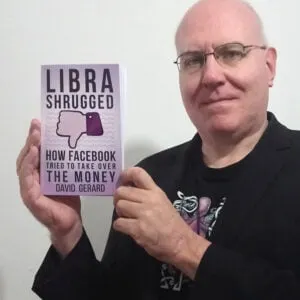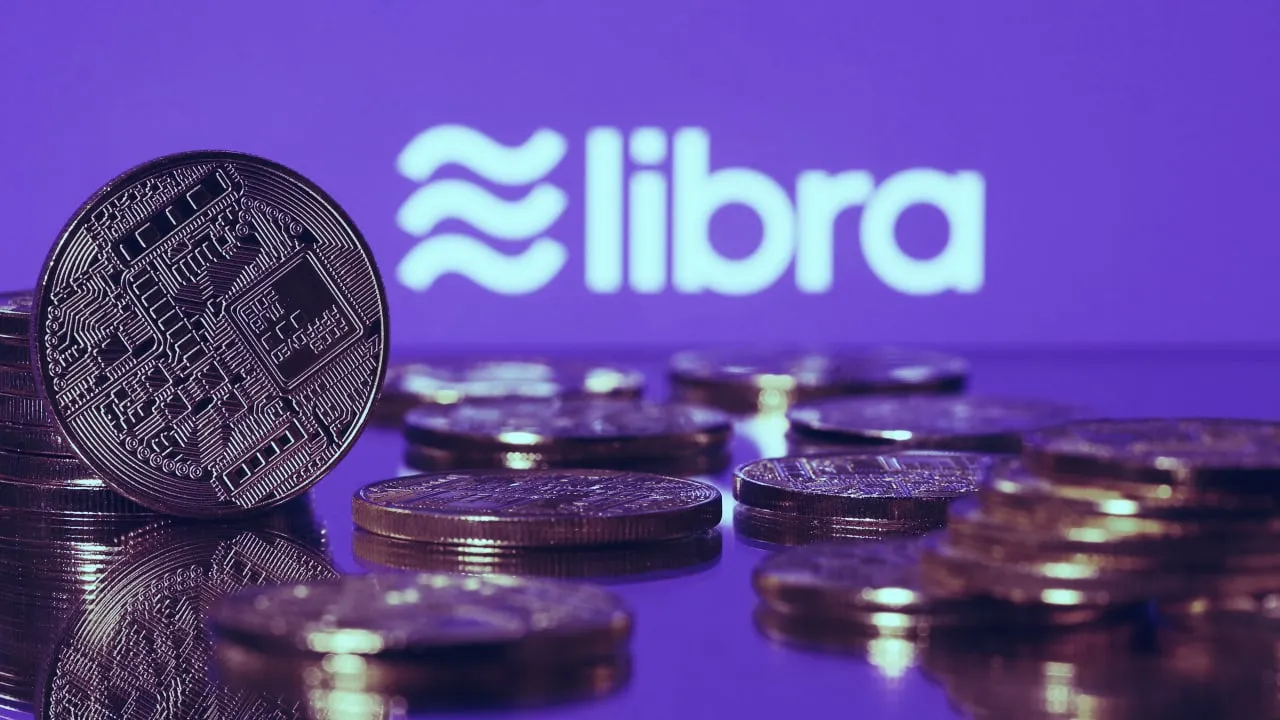[Editor's note: Our old friend, blockchain hater David Gerard, has a new book out, Libra Shrugged: How Facebook tried to take over the money. You can buy it on Amazon, or "other ebook stores for people who hate Amazon," per Gerard. Here's an excerpt from the introduction.]
A user's guide to Libra
Facebook wants to do its own payment system, called Libra—with its own currency! What does this mean for you? What’s the fabulous future that Facebook has planned for you?
None of this exists yet—and it might never exist. In fact, this is the severely cut-down version of what Facebook really wanted to do. But if everything does all work out as Facebook has described… it’ll work a bit like this.
What’s a Libra? What’s it worth?
A Libra is a currency unit in the Libra system. Like dollars, or pounds, or euros. Its symbol is ≋—three wavy lines.
The exchange rate to your local currency isn’t quite fixed—it’s set to the average of a “basket” of various other currencies.
If you’re buying something where the price isn’t listed in Libras, what you pay will go up and down from day to day—welcome to the currency markets! Get used to doing quick calculations whenever you want to buy something.
Or just ignore the Libras, and use your local currency in the Libra system—like you would in PayPal.

How do I use Libra?
You have a Libra wallet—an app on your phone that lets you use your money—probably from Novi (formerly called Calibra), which is Facebook. If you want to use your local currency (dollars, pounds, euros), it’ll work a lot like PayPal—you have money in an account on Novi, and you can send money to other Libra users.
If you want to use the Libra currency, you can buy Libras with cash, or sell them for cash. The price will depend on the value of the Libra basket of currencies that day. You’ll need to have your government identification on file with Novi.
You can send money or Libras to anyone with a Libra wallet—Novi or not—anywhere in the world.
You can buy things with Libras—if they’re for sale with a price in Libras.
What about my personal information? This is pretty private stuff.
Novi says that it won’t share your data with the main Facebook organisation—except in as-yet-undefined circumstances.
Kevin Weil, vice president of product for Novi, says: “Your financial data will never be used to target ads on Facebook.”
You can definitely trust Facebook on this firm promise! And never mind all the times Facebook broke privacy promises previously, including their 2019 Federal Trade Commission fine and settlement for breaking their previous 2011 settlement over privacy issues.
Libra looks very like Facebook building a massive data-miner on top of the entire system of consumer commerce—but they told US Congress that this definitely won’t happen with Novi, at least. It’ll be fine.
Am I stuck with Facebook and Novi?
There will apparently be other Libra wallet providers—though as of late 2020, no-one else has announced any plans. Facebook apps, such as Messenger and WhatsApp, will only be able to use Novi—but you’ll be able to send Libras (or dollars or pounds or euros on Libra) to and from the other providers, if any ever come along.
Novi promises full data portability—so you can move all your Libra money and data to a new provider.
So I can send money to anyone?
Almost anyone! You have to keep to the anti-money-laundering laws you’re under right now.
Sometimes people will send you money or Libras, and Novi will freeze the payment. Or you’ll try to send money or Libras, and you’ll be told Novi can’t let you pay that person. Or sometimes Novi will freeze your account, or suddenly shut it down.
This is just like PayPal does, for the same reasons—which they may or may not tell you. All of this follows directly from the anti-money-laundering laws—so Novi can’t legally promise you that none of this will ever happen.
But Novi-to-Novi transfers will almost certainly go through!
Is this a cryptocurrency? Can I get rich from this?
Libra is based on cryptocurrency ideas, but it all revolves around “stablecoins”—digital currencies that try to keep a fixed value. The Libra currency unit is not intended to be an investment or a speculative gamble, like buying bitcoins and hoping they’ll go up in price, or foreign exchange trading. (It might turn out to be one in practice.)
The ordinary currencies on Libra will always be exchangeable at $1 on Libra = $1 cash, £1 on Libra =£1 cash, and so on. The price of the Libra currency itself is calculated from the national currencies to be as stable as possible, even if they change price against each other.
What’s a cryptocurrency, anyway? Do I care?
Probably not. From your perspective, the stuff on Libra is money, and you can spend it on things—the same way you can spend Amazon gift voucher dollars, or loyalty points at supermarkets.
Novi says they’ll keep track of things for you—they’re doing a “custodial wallet,” which would work a lot like having money in an account at PayPal. Novi will have customer support if you lose your phone or your password, or if you get scammed.
This isn’t the usual case with cryptocurrencies. With Bitcoin and so on, if someone picks your pocket from the other side of the world, those are their coins now—getting your coins back is tedious and unlikely.
You can use a different custodial wallet for your money on Libra, which will be under much the same rules as Novi.
Some crypto fans like to live dangerously and keep the cryptographic keys to their crypto-coins themselves, like keeping your savings in a sock under your mattress—all the control, all the risk, and they might have trouble sending money on Libra to or from the Novi system—but the financial regulators absolutely won’t be letting that happen with Libra in the foreseeable future.
(Cryptographers get understandably annoyed when “cryptocurrency” is shortened to “crypto.” Sadly, it’s standard finance jargon now.)
How does any of this make my life better? Why should I sign up?
Libra promises a fabulously efficient financial future—“paying bills with the push of a button, buying a cup of coffee with the scan of a code or riding your local public transit without needing to carry cash or a metro pass.” Imagine if you could do all of that!
If you’re in Europe or Asia rather than the United States, you’ve had all of that for the past decade or so with the card or phone that’s already in your pocket—without a weird “basket” currency in the way.
A lot of the problems that Facebook claims Libra solves are really just US retail banking being a few decades behind the rest of the world—sending money between banks can take days, everything has fees, so many things need a phone call, paper checks are still a thing, and so on. But it’s standard in Silicon Valley to propose an all-encompassing international system, and base it entirely on looking out your window in Palo Alto.
Various commentators have come up with ideas on how Facebook could make Libra more tempting as a product—promotions, discounts and so on—but none of these have been suggested by Facebook itself.
The important use cases that Facebook and Libra have put forward are sending money internationally, and giving access to finance to billions of people who don’t have it yet—“banking the unbanked.” They’ve also suggested that more commerce in general will mean Facebook might be able to sell ads for higher prices. They’re not at all clear on the tricky details for any of these.
In the meantime, Libra will be a sort of PayPal, but on Facebook. Maybe that’ll be useful to you.
What’s the point of all this?
There’s the obvious motivation where Facebook gets to see all your spending data. But why are they doing it like this? Why’s there a new currency in there? Why’s there a “blockchain?”
This PayPal-but-it’s-Facebook system is Libra’s fallback position from what they originally wanted to build—which was a much weirder system, based on some wild ideas they got from Bitcoin and the other cryptocurrencies.
None of these ideas would work at scale, and everything would break. This is what got governments around the world so upset at Libra, so quickly.
So why did anyone think this was a good idea?

